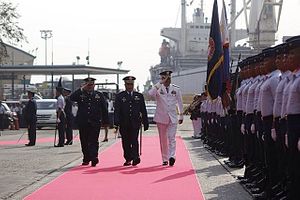On February 10, Japan and the Philippines held the fifth iteration of their defense vice-ministerial dialogue (See: “What’s Next For Japan-Philippines Relations Under Duterte?”). Though a range of issues were discussed, the one that made the headlines was talk of Japan joining in ongoing efforts by the Philippines, Indonesia, and Malaysia to undertake trilateral patrols to counter piracy and terrorism in their surrounding waters.
Officially, according to a statement released by the Philippine defense ministry following the meeting, Japan’s Vice-Minister for International Trade Ro Manabe “expressed Japan’s readiness to contribute in the trilateral cooperation among the Philippines, Indonesia and Malaysia in addressing piracy and terrorism.” Manabe also “requested the Philippines to convey how Japan could best assist in curbing piracy and kidnapping in the three countries’ shared maritime areas.”
Little specifics were given regarding this “readiness to contribute.” Reuters reported that a senior Philippine defense official had said that Japan had offered to send patrol ships in the lead paragraph, but then went on a few paragraphs later to cite a senior Japanese defense ministry official as stating that no offer of patrols was made to the Philippines, only “capacity-building.”
Capacity-building would certainly be more along the lines of what Japan has already been doing with Southeast Asian states including the Philippines. Tokyo has already provided a range of defense equipment to Manila, including patrol vessels and maritime surveillance aircraft, and additional assistance along these lines had already been discussed. Some of this, such as the multi-role response vessels (MRRVs) the Philippine Coast Guard has received from Japan through the Maritime Safety Capability Improvement Project, have already been used to fight terrorism and piracy.
Region-wise, as I have noted before, Japan is also considering other ASEAN-wide defense initiatives, as outlined in its Vientiane Vision last year (See: “Japan Reveals First ASEAN Defense Initiative with Vientiane Vision”). Maritime security capacity-building is unsurprisingly a major part of this, and it reportedly includes a new coast guard body as well that will lead various initiatives such as training and international symposiums.
Japan’s participation in patrols, though, would seem to be rather premature at this stage. It is true that Malaysia, Indonesia, and Philippines have been making inroads on collaboration amongst themselves, having agreed earlier this year to undertake trilateral patrols in the Sulu-Sulawesi Seas following a recent spate of kidnappings involving Malaysian and Indonesian nationals by the Abu Sayyaf Group, which is based in the southern Philippines (See: “Confronting Threats in the Sulu-Sulawesi Seas: Opportunities and Challenges”). But as was expected at the outset, implementation has been slower than some would have liked. And Duterte himself has said as much.
There has been talk from the Philippines about some participation or contribution from other countries, most notably China and the United States. But as I have emphasized previously, Southeast Asian states have traditionally dealt with challenges in their surrounding waters largely individually or among themselves rather than with extraregional actors due to various reasons including sensitivities around lingering interstate disputes as well as suspicion about meddling by outside powers (See: “Can China Patrols Help Duterte in the Philippines’ Terror War?”). That explains Japan’s caution when dealing with issues of this ilk.
This is not to say that there haven’t been efforts by outside states to facilitate maritime cooperation around the Sulu-Sulawesi seas – the coordinated multilateral training activity that the United States conducted with the Philippine and Malaysian militaries last June amid the Shangri-La Dialogue was a case in point (See: “The Other Sea That Dominated the 2016 Shangri-La Dialogue”). But it is to say that if involvement by outside actors in the trilateral patrols themselves, as opposed to just capacity-building for individual countries, is to gain steam, it would have to be done in consultation with all three nations in question, not just the Philippines.
Until we see clear signs of this, it is best to treat stories about extraregional involvement in the Sulu-Sulawesi seas with caution rather than giving in to the hype that often accompanies them.































